Entrepreneurial Spirit in Micro and Small Business Firms
VerifiedAdded on 2019/12/04
|14
|4548
|287
Essay
AI Summary
Micro and small business firms play a significant role in the development of both social and economic aspects. They contribute significantly to employment, develop unique products, and have different personal traits that set them apart from other entrepreneurs. These traits include taking big challenges, being self-motivated, and having learning skills, which enable them to understand others, value their perspectives, accept responsibility, and manage strong relationships within and outside the firm.
Contribute Materials
Your contribution can guide someone’s learning journey. Share your
documents today.
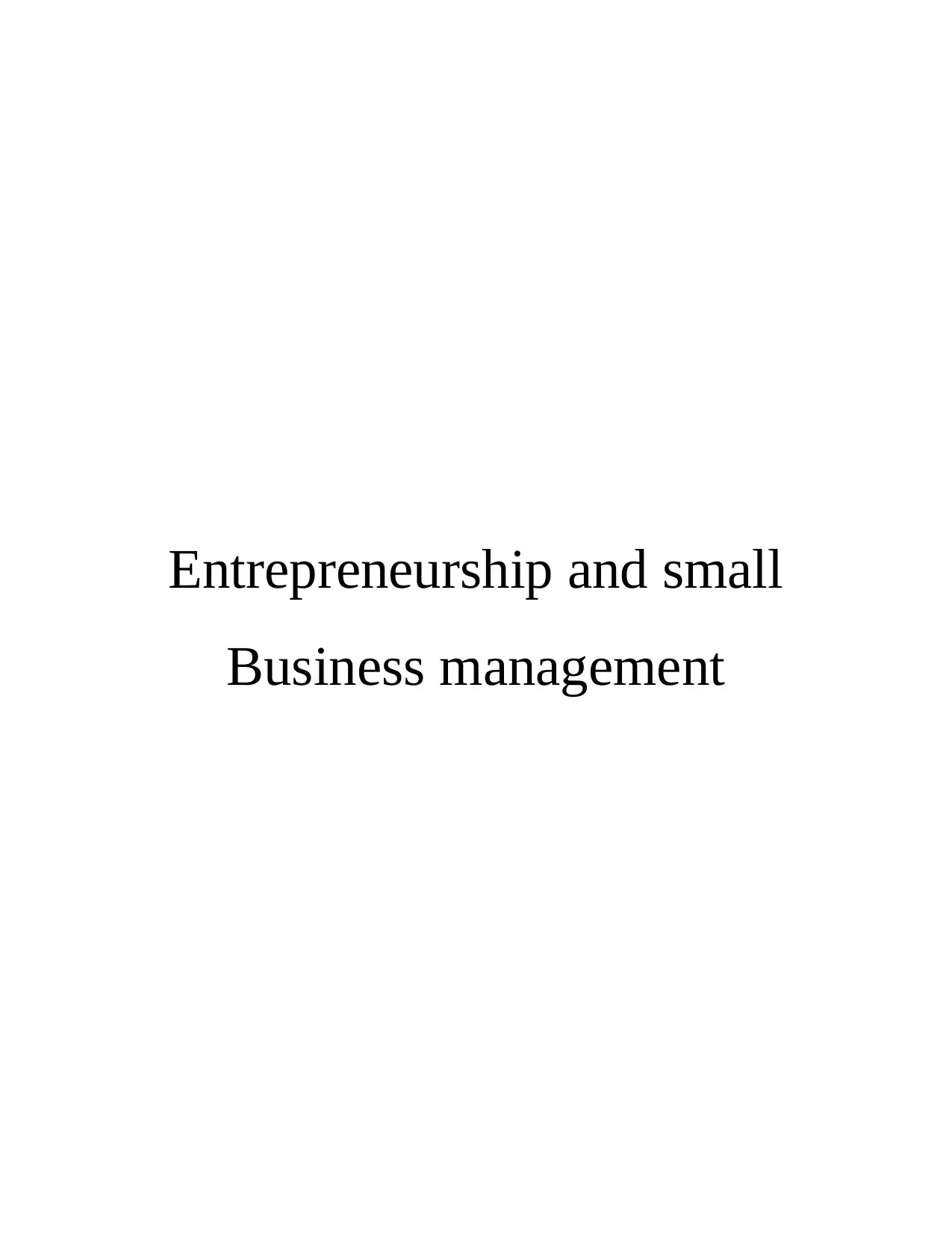
Entrepreneurship and small
Business management
Business management
Secure Best Marks with AI Grader
Need help grading? Try our AI Grader for instant feedback on your assignments.
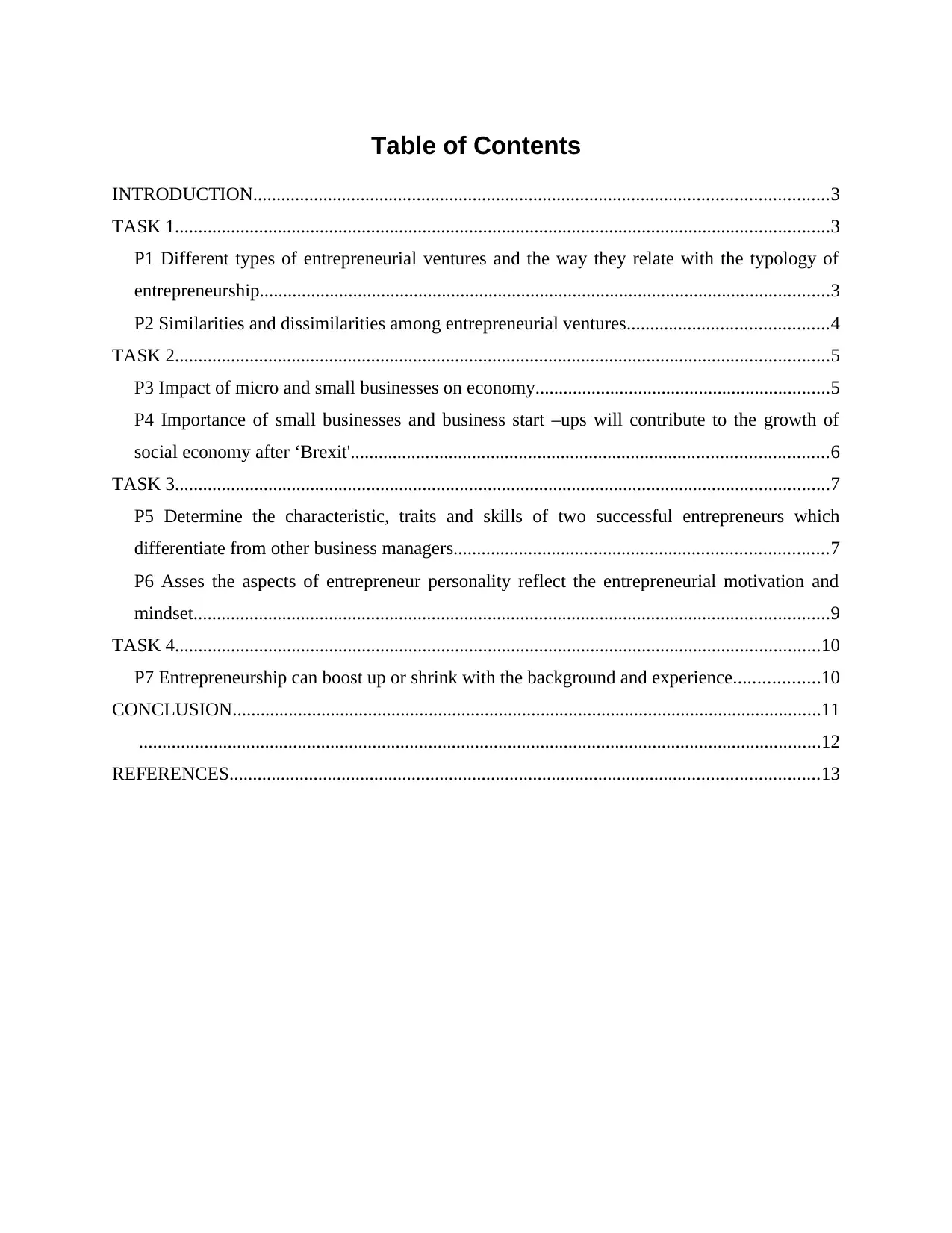
Table of Contents
INTRODUCTION...........................................................................................................................3
TASK 1............................................................................................................................................3
P1 Different types of entrepreneurial ventures and the way they relate with the typology of
entrepreneurship..........................................................................................................................3
P2 Similarities and dissimilarities among entrepreneurial ventures...........................................4
TASK 2............................................................................................................................................5
P3 Impact of micro and small businesses on economy...............................................................5
P4 Importance of small businesses and business start –ups will contribute to the growth of
social economy after ‘Brexit'......................................................................................................6
TASK 3............................................................................................................................................7
P5 Determine the characteristic, traits and skills of two successful entrepreneurs which
differentiate from other business managers................................................................................7
P6 Asses the aspects of entrepreneur personality reflect the entrepreneurial motivation and
mindset........................................................................................................................................9
TASK 4..........................................................................................................................................10
P7 Entrepreneurship can boost up or shrink with the background and experience..................10
CONCLUSION..............................................................................................................................11
..................................................................................................................................................12
REFERENCES..............................................................................................................................13
INTRODUCTION...........................................................................................................................3
TASK 1............................................................................................................................................3
P1 Different types of entrepreneurial ventures and the way they relate with the typology of
entrepreneurship..........................................................................................................................3
P2 Similarities and dissimilarities among entrepreneurial ventures...........................................4
TASK 2............................................................................................................................................5
P3 Impact of micro and small businesses on economy...............................................................5
P4 Importance of small businesses and business start –ups will contribute to the growth of
social economy after ‘Brexit'......................................................................................................6
TASK 3............................................................................................................................................7
P5 Determine the characteristic, traits and skills of two successful entrepreneurs which
differentiate from other business managers................................................................................7
P6 Asses the aspects of entrepreneur personality reflect the entrepreneurial motivation and
mindset........................................................................................................................................9
TASK 4..........................................................................................................................................10
P7 Entrepreneurship can boost up or shrink with the background and experience..................10
CONCLUSION..............................................................................................................................11
..................................................................................................................................................12
REFERENCES..............................................................................................................................13
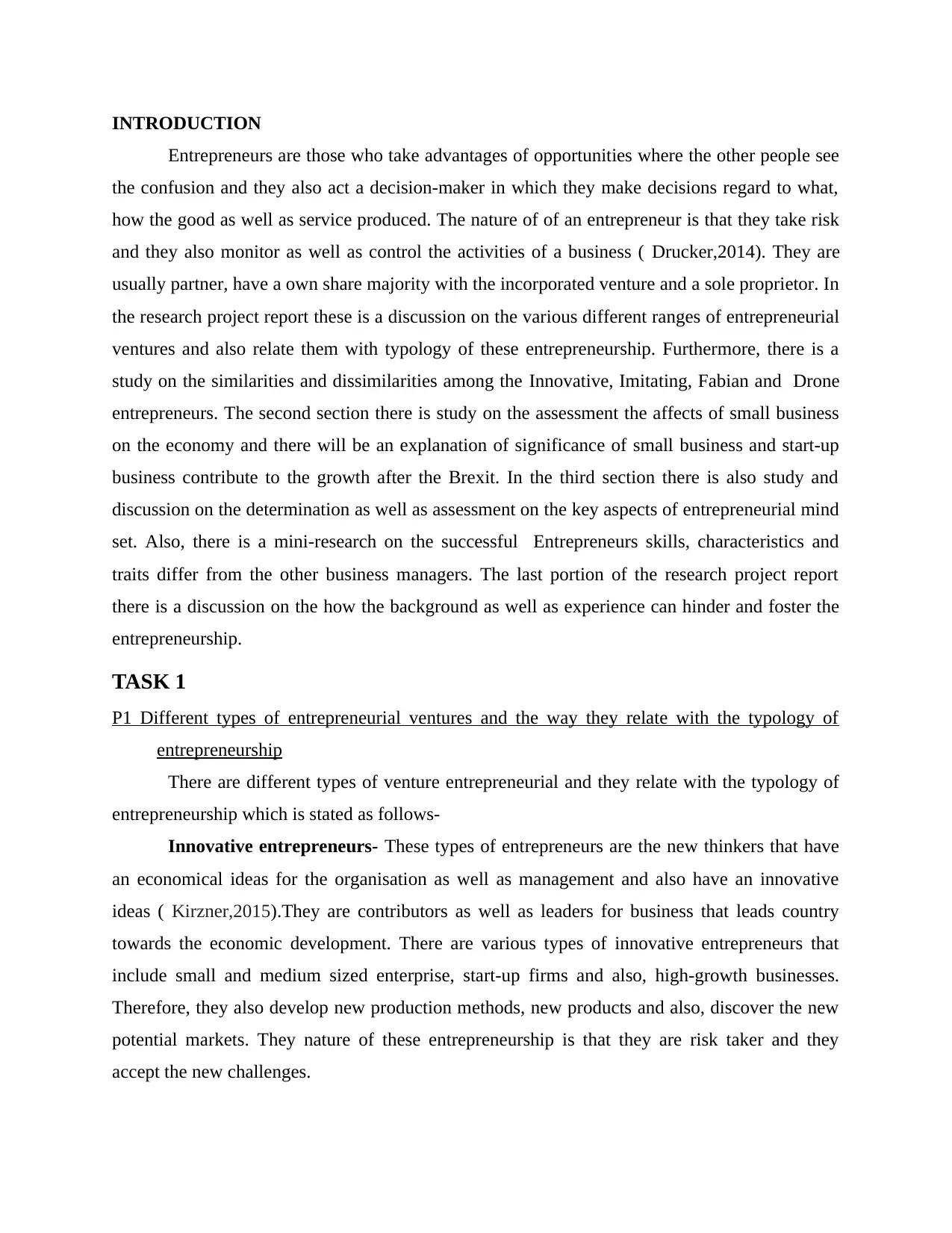
INTRODUCTION
Entrepreneurs are those who take advantages of opportunities where the other people see
the confusion and they also act a decision-maker in which they make decisions regard to what,
how the good as well as service produced. The nature of of an entrepreneur is that they take risk
and they also monitor as well as control the activities of a business ( Drucker,2014). They are
usually partner, have a own share majority with the incorporated venture and a sole proprietor. In
the research project report these is a discussion on the various different ranges of entrepreneurial
ventures and also relate them with typology of these entrepreneurship. Furthermore, there is a
study on the similarities and dissimilarities among the Innovative, Imitating, Fabian and Drone
entrepreneurs. The second section there is study on the assessment the affects of small business
on the economy and there will be an explanation of significance of small business and start-up
business contribute to the growth after the Brexit. In the third section there is also study and
discussion on the determination as well as assessment on the key aspects of entrepreneurial mind
set. Also, there is a mini-research on the successful Entrepreneurs skills, characteristics and
traits differ from the other business managers. The last portion of the research project report
there is a discussion on the how the background as well as experience can hinder and foster the
entrepreneurship.
TASK 1
P1 Different types of entrepreneurial ventures and the way they relate with the typology of
entrepreneurship
There are different types of venture entrepreneurial and they relate with the typology of
entrepreneurship which is stated as follows-
Innovative entrepreneurs- These types of entrepreneurs are the new thinkers that have
an economical ideas for the organisation as well as management and also have an innovative
ideas ( Kirzner,2015).They are contributors as well as leaders for business that leads country
towards the economic development. There are various types of innovative entrepreneurs that
include small and medium sized enterprise, start-up firms and also, high-growth businesses.
Therefore, they also develop new production methods, new products and also, discover the new
potential markets. They nature of these entrepreneurship is that they are risk taker and they
accept the new challenges.
Entrepreneurs are those who take advantages of opportunities where the other people see
the confusion and they also act a decision-maker in which they make decisions regard to what,
how the good as well as service produced. The nature of of an entrepreneur is that they take risk
and they also monitor as well as control the activities of a business ( Drucker,2014). They are
usually partner, have a own share majority with the incorporated venture and a sole proprietor. In
the research project report these is a discussion on the various different ranges of entrepreneurial
ventures and also relate them with typology of these entrepreneurship. Furthermore, there is a
study on the similarities and dissimilarities among the Innovative, Imitating, Fabian and Drone
entrepreneurs. The second section there is study on the assessment the affects of small business
on the economy and there will be an explanation of significance of small business and start-up
business contribute to the growth after the Brexit. In the third section there is also study and
discussion on the determination as well as assessment on the key aspects of entrepreneurial mind
set. Also, there is a mini-research on the successful Entrepreneurs skills, characteristics and
traits differ from the other business managers. The last portion of the research project report
there is a discussion on the how the background as well as experience can hinder and foster the
entrepreneurship.
TASK 1
P1 Different types of entrepreneurial ventures and the way they relate with the typology of
entrepreneurship
There are different types of venture entrepreneurial and they relate with the typology of
entrepreneurship which is stated as follows-
Innovative entrepreneurs- These types of entrepreneurs are the new thinkers that have
an economical ideas for the organisation as well as management and also have an innovative
ideas ( Kirzner,2015).They are contributors as well as leaders for business that leads country
towards the economic development. There are various types of innovative entrepreneurs that
include small and medium sized enterprise, start-up firms and also, high-growth businesses.
Therefore, they also develop new production methods, new products and also, discover the new
potential markets. They nature of these entrepreneurship is that they are risk taker and they
accept the new challenges.
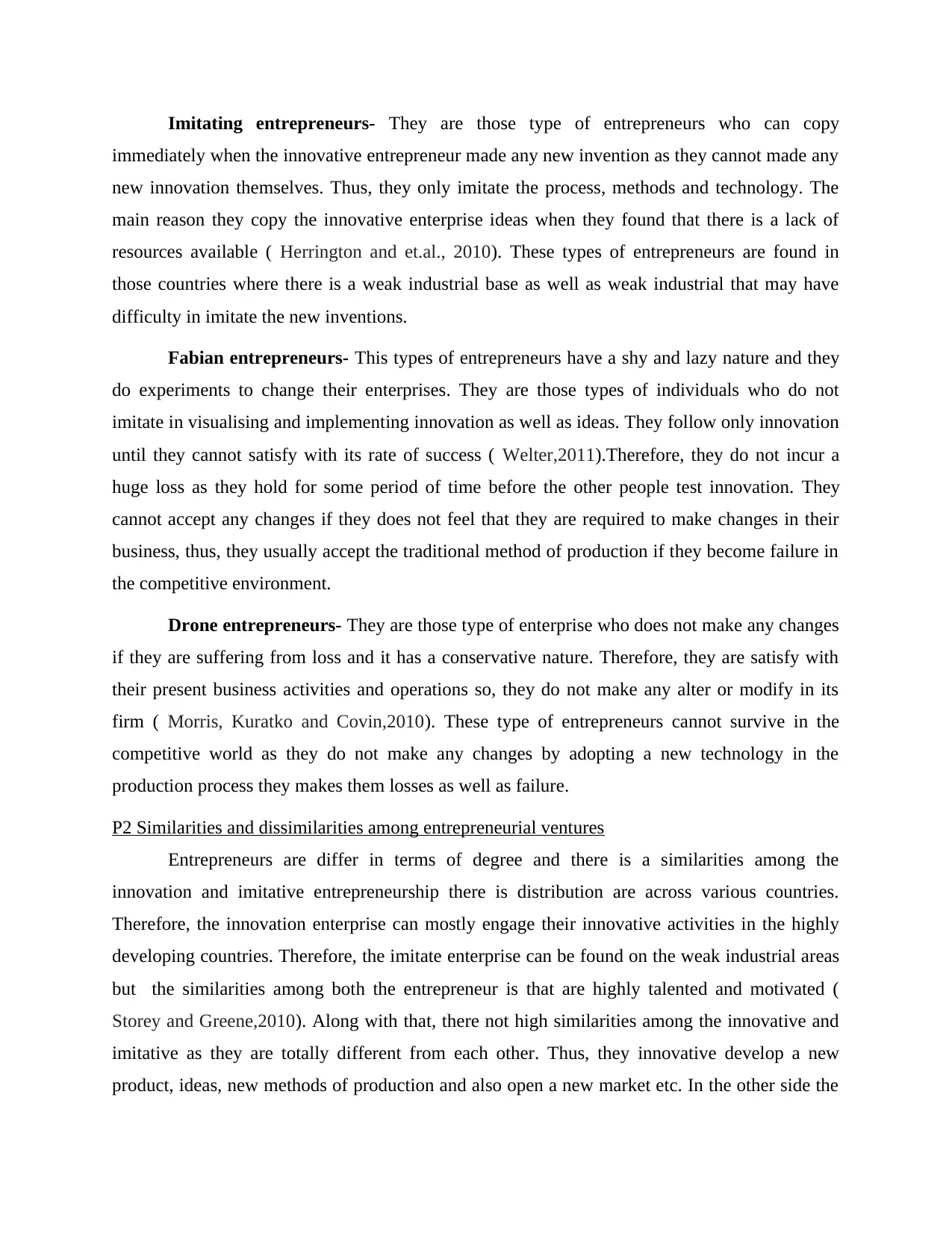
Imitating entrepreneurs- They are those type of entrepreneurs who can copy
immediately when the innovative entrepreneur made any new invention as they cannot made any
new innovation themselves. Thus, they only imitate the process, methods and technology. The
main reason they copy the innovative enterprise ideas when they found that there is a lack of
resources available ( Herrington and et.al., 2010). These types of entrepreneurs are found in
those countries where there is a weak industrial base as well as weak industrial that may have
difficulty in imitate the new inventions.
Fabian entrepreneurs- This types of entrepreneurs have a shy and lazy nature and they
do experiments to change their enterprises. They are those types of individuals who do not
imitate in visualising and implementing innovation as well as ideas. They follow only innovation
until they cannot satisfy with its rate of success ( Welter,2011).Therefore, they do not incur a
huge loss as they hold for some period of time before the other people test innovation. They
cannot accept any changes if they does not feel that they are required to make changes in their
business, thus, they usually accept the traditional method of production if they become failure in
the competitive environment.
Drone entrepreneurs- They are those type of enterprise who does not make any changes
if they are suffering from loss and it has a conservative nature. Therefore, they are satisfy with
their present business activities and operations so, they do not make any alter or modify in its
firm ( Morris, Kuratko and Covin,2010). These type of entrepreneurs cannot survive in the
competitive world as they do not make any changes by adopting a new technology in the
production process they makes them losses as well as failure.
P2 Similarities and dissimilarities among entrepreneurial ventures
Entrepreneurs are differ in terms of degree and there is a similarities among the
innovation and imitative entrepreneurship there is distribution are across various countries.
Therefore, the innovation enterprise can mostly engage their innovative activities in the highly
developing countries. Therefore, the imitate enterprise can be found on the weak industrial areas
but the similarities among both the entrepreneur is that are highly talented and motivated (
Storey and Greene,2010). Along with that, there not high similarities among the innovative and
imitative as they are totally different from each other. Thus, they innovative develop a new
product, ideas, new methods of production and also open a new market etc. In the other side the
immediately when the innovative entrepreneur made any new invention as they cannot made any
new innovation themselves. Thus, they only imitate the process, methods and technology. The
main reason they copy the innovative enterprise ideas when they found that there is a lack of
resources available ( Herrington and et.al., 2010). These types of entrepreneurs are found in
those countries where there is a weak industrial base as well as weak industrial that may have
difficulty in imitate the new inventions.
Fabian entrepreneurs- This types of entrepreneurs have a shy and lazy nature and they
do experiments to change their enterprises. They are those types of individuals who do not
imitate in visualising and implementing innovation as well as ideas. They follow only innovation
until they cannot satisfy with its rate of success ( Welter,2011).Therefore, they do not incur a
huge loss as they hold for some period of time before the other people test innovation. They
cannot accept any changes if they does not feel that they are required to make changes in their
business, thus, they usually accept the traditional method of production if they become failure in
the competitive environment.
Drone entrepreneurs- They are those type of enterprise who does not make any changes
if they are suffering from loss and it has a conservative nature. Therefore, they are satisfy with
their present business activities and operations so, they do not make any alter or modify in its
firm ( Morris, Kuratko and Covin,2010). These type of entrepreneurs cannot survive in the
competitive world as they do not make any changes by adopting a new technology in the
production process they makes them losses as well as failure.
P2 Similarities and dissimilarities among entrepreneurial ventures
Entrepreneurs are differ in terms of degree and there is a similarities among the
innovation and imitative entrepreneurship there is distribution are across various countries.
Therefore, the innovation enterprise can mostly engage their innovative activities in the highly
developing countries. Therefore, the imitate enterprise can be found on the weak industrial areas
but the similarities among both the entrepreneur is that are highly talented and motivated (
Storey and Greene,2010). Along with that, there not high similarities among the innovative and
imitative as they are totally different from each other. Thus, they innovative develop a new
product, ideas, new methods of production and also open a new market etc. In the other side the
Secure Best Marks with AI Grader
Need help grading? Try our AI Grader for instant feedback on your assignments.
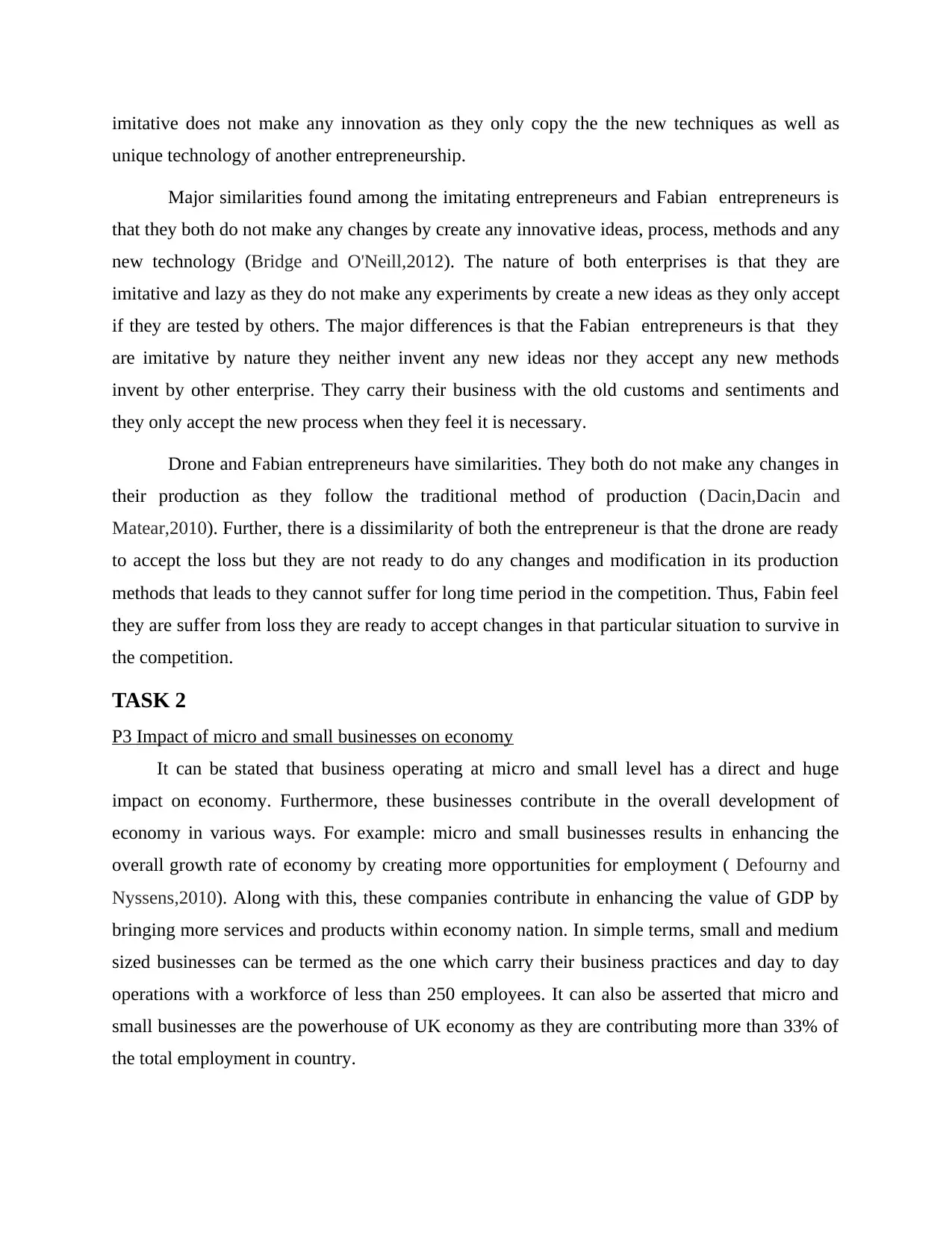
imitative does not make any innovation as they only copy the the new techniques as well as
unique technology of another entrepreneurship.
Major similarities found among the imitating entrepreneurs and Fabian entrepreneurs is
that they both do not make any changes by create any innovative ideas, process, methods and any
new technology (Bridge and O'Neill,2012). The nature of both enterprises is that they are
imitative and lazy as they do not make any experiments by create a new ideas as they only accept
if they are tested by others. The major differences is that the Fabian entrepreneurs is that they
are imitative by nature they neither invent any new ideas nor they accept any new methods
invent by other enterprise. They carry their business with the old customs and sentiments and
they only accept the new process when they feel it is necessary.
Drone and Fabian entrepreneurs have similarities. They both do not make any changes in
their production as they follow the traditional method of production (Dacin,Dacin and
Matear,2010). Further, there is a dissimilarity of both the entrepreneur is that the drone are ready
to accept the loss but they are not ready to do any changes and modification in its production
methods that leads to they cannot suffer for long time period in the competition. Thus, Fabin feel
they are suffer from loss they are ready to accept changes in that particular situation to survive in
the competition.
TASK 2
P3 Impact of micro and small businesses on economy
It can be stated that business operating at micro and small level has a direct and huge
impact on economy. Furthermore, these businesses contribute in the overall development of
economy in various ways. For example: micro and small businesses results in enhancing the
overall growth rate of economy by creating more opportunities for employment ( Defourny and
Nyssens,2010). Along with this, these companies contribute in enhancing the value of GDP by
bringing more services and products within economy nation. In simple terms, small and medium
sized businesses can be termed as the one which carry their business practices and day to day
operations with a workforce of less than 250 employees. It can also be asserted that micro and
small businesses are the powerhouse of UK economy as they are contributing more than 33% of
the total employment in country.
unique technology of another entrepreneurship.
Major similarities found among the imitating entrepreneurs and Fabian entrepreneurs is
that they both do not make any changes by create any innovative ideas, process, methods and any
new technology (Bridge and O'Neill,2012). The nature of both enterprises is that they are
imitative and lazy as they do not make any experiments by create a new ideas as they only accept
if they are tested by others. The major differences is that the Fabian entrepreneurs is that they
are imitative by nature they neither invent any new ideas nor they accept any new methods
invent by other enterprise. They carry their business with the old customs and sentiments and
they only accept the new process when they feel it is necessary.
Drone and Fabian entrepreneurs have similarities. They both do not make any changes in
their production as they follow the traditional method of production (Dacin,Dacin and
Matear,2010). Further, there is a dissimilarity of both the entrepreneur is that the drone are ready
to accept the loss but they are not ready to do any changes and modification in its production
methods that leads to they cannot suffer for long time period in the competition. Thus, Fabin feel
they are suffer from loss they are ready to accept changes in that particular situation to survive in
the competition.
TASK 2
P3 Impact of micro and small businesses on economy
It can be stated that business operating at micro and small level has a direct and huge
impact on economy. Furthermore, these businesses contribute in the overall development of
economy in various ways. For example: micro and small businesses results in enhancing the
overall growth rate of economy by creating more opportunities for employment ( Defourny and
Nyssens,2010). Along with this, these companies contribute in enhancing the value of GDP by
bringing more services and products within economy nation. In simple terms, small and medium
sized businesses can be termed as the one which carry their business practices and day to day
operations with a workforce of less than 250 employees. It can also be asserted that micro and
small businesses are the powerhouse of UK economy as they are contributing more than 33% of
the total employment in country.
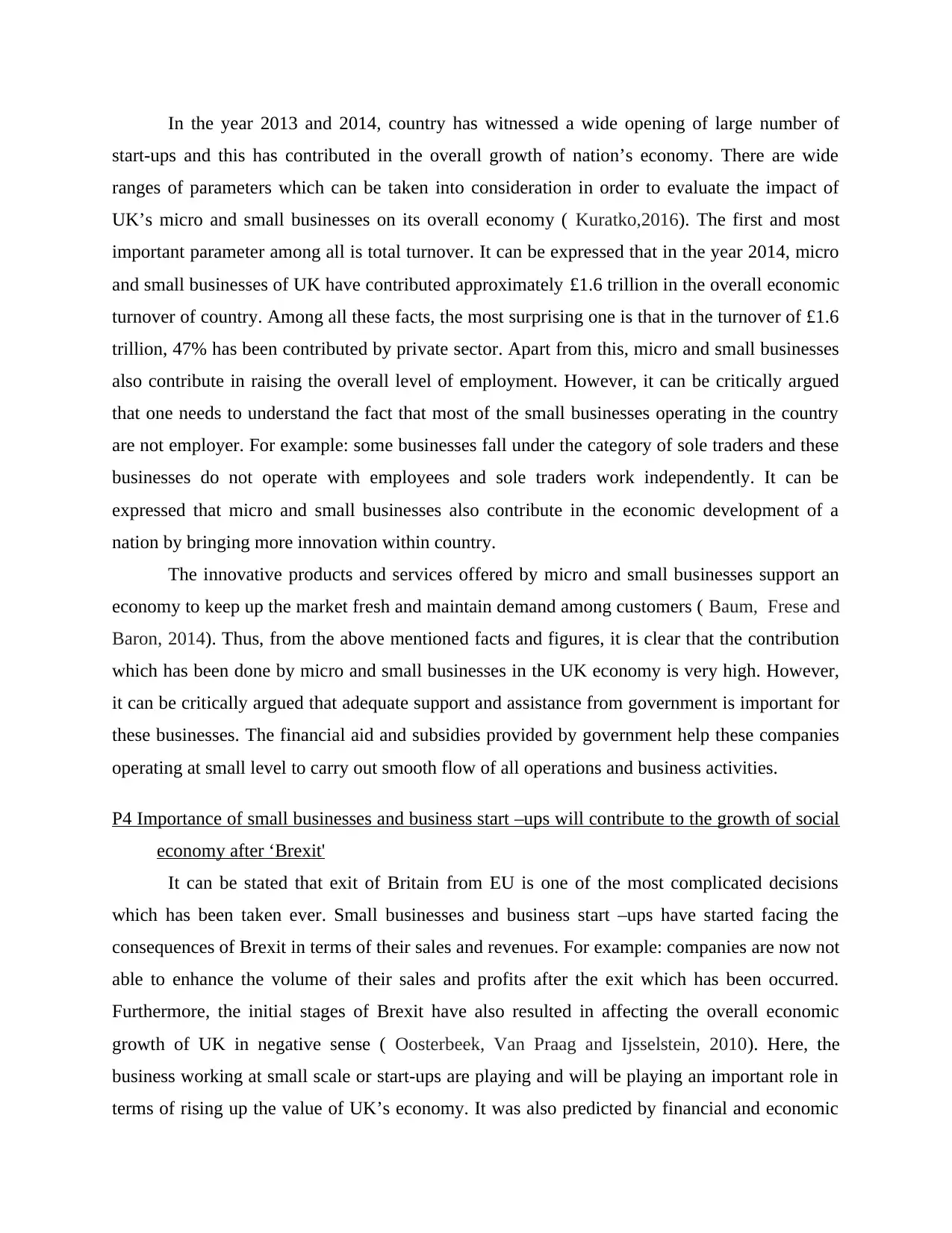
In the year 2013 and 2014, country has witnessed a wide opening of large number of
start-ups and this has contributed in the overall growth of nation’s economy. There are wide
ranges of parameters which can be taken into consideration in order to evaluate the impact of
UK’s micro and small businesses on its overall economy ( Kuratko,2016). The first and most
important parameter among all is total turnover. It can be expressed that in the year 2014, micro
and small businesses of UK have contributed approximately £1.6 trillion in the overall economic
turnover of country. Among all these facts, the most surprising one is that in the turnover of £1.6
trillion, 47% has been contributed by private sector. Apart from this, micro and small businesses
also contribute in raising the overall level of employment. However, it can be critically argued
that one needs to understand the fact that most of the small businesses operating in the country
are not employer. For example: some businesses fall under the category of sole traders and these
businesses do not operate with employees and sole traders work independently. It can be
expressed that micro and small businesses also contribute in the economic development of a
nation by bringing more innovation within country.
The innovative products and services offered by micro and small businesses support an
economy to keep up the market fresh and maintain demand among customers ( Baum, Frese and
Baron, 2014). Thus, from the above mentioned facts and figures, it is clear that the contribution
which has been done by micro and small businesses in the UK economy is very high. However,
it can be critically argued that adequate support and assistance from government is important for
these businesses. The financial aid and subsidies provided by government help these companies
operating at small level to carry out smooth flow of all operations and business activities.
P4 Importance of small businesses and business start –ups will contribute to the growth of social
economy after ‘Brexit'
It can be stated that exit of Britain from EU is one of the most complicated decisions
which has been taken ever. Small businesses and business start –ups have started facing the
consequences of Brexit in terms of their sales and revenues. For example: companies are now not
able to enhance the volume of their sales and profits after the exit which has been occurred.
Furthermore, the initial stages of Brexit have also resulted in affecting the overall economic
growth of UK in negative sense ( Oosterbeek, Van Praag and Ijsselstein, 2010). Here, the
business working at small scale or start-ups are playing and will be playing an important role in
terms of rising up the value of UK’s economy. It was also predicted by financial and economic
start-ups and this has contributed in the overall growth of nation’s economy. There are wide
ranges of parameters which can be taken into consideration in order to evaluate the impact of
UK’s micro and small businesses on its overall economy ( Kuratko,2016). The first and most
important parameter among all is total turnover. It can be expressed that in the year 2014, micro
and small businesses of UK have contributed approximately £1.6 trillion in the overall economic
turnover of country. Among all these facts, the most surprising one is that in the turnover of £1.6
trillion, 47% has been contributed by private sector. Apart from this, micro and small businesses
also contribute in raising the overall level of employment. However, it can be critically argued
that one needs to understand the fact that most of the small businesses operating in the country
are not employer. For example: some businesses fall under the category of sole traders and these
businesses do not operate with employees and sole traders work independently. It can be
expressed that micro and small businesses also contribute in the economic development of a
nation by bringing more innovation within country.
The innovative products and services offered by micro and small businesses support an
economy to keep up the market fresh and maintain demand among customers ( Baum, Frese and
Baron, 2014). Thus, from the above mentioned facts and figures, it is clear that the contribution
which has been done by micro and small businesses in the UK economy is very high. However,
it can be critically argued that adequate support and assistance from government is important for
these businesses. The financial aid and subsidies provided by government help these companies
operating at small level to carry out smooth flow of all operations and business activities.
P4 Importance of small businesses and business start –ups will contribute to the growth of social
economy after ‘Brexit'
It can be stated that exit of Britain from EU is one of the most complicated decisions
which has been taken ever. Small businesses and business start –ups have started facing the
consequences of Brexit in terms of their sales and revenues. For example: companies are now not
able to enhance the volume of their sales and profits after the exit which has been occurred.
Furthermore, the initial stages of Brexit have also resulted in affecting the overall economic
growth of UK in negative sense ( Oosterbeek, Van Praag and Ijsselstein, 2010). Here, the
business working at small scale or start-ups are playing and will be playing an important role in
terms of rising up the value of UK’s economy. It was also predicted by financial and economic
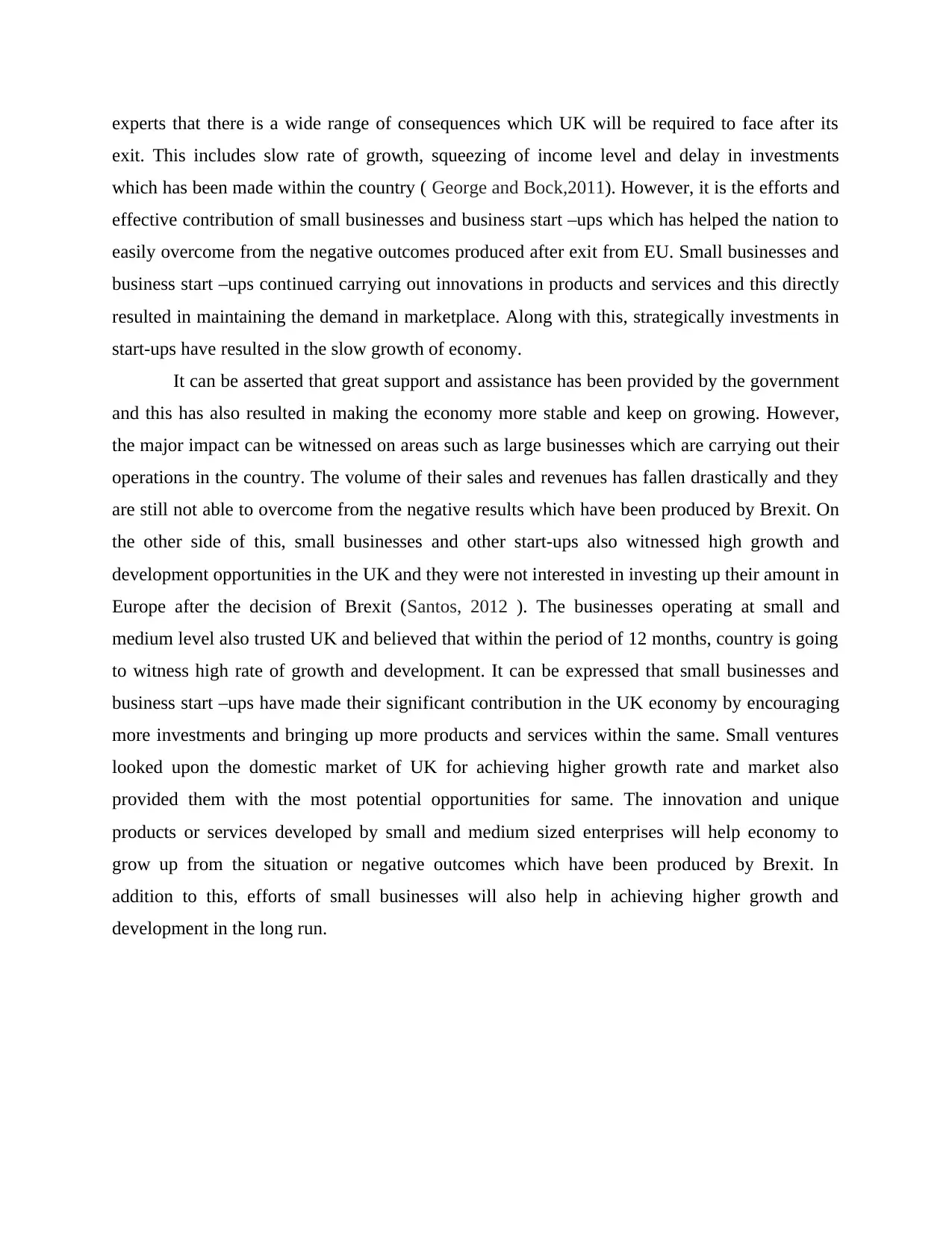
experts that there is a wide range of consequences which UK will be required to face after its
exit. This includes slow rate of growth, squeezing of income level and delay in investments
which has been made within the country ( George and Bock,2011). However, it is the efforts and
effective contribution of small businesses and business start –ups which has helped the nation to
easily overcome from the negative outcomes produced after exit from EU. Small businesses and
business start –ups continued carrying out innovations in products and services and this directly
resulted in maintaining the demand in marketplace. Along with this, strategically investments in
start-ups have resulted in the slow growth of economy.
It can be asserted that great support and assistance has been provided by the government
and this has also resulted in making the economy more stable and keep on growing. However,
the major impact can be witnessed on areas such as large businesses which are carrying out their
operations in the country. The volume of their sales and revenues has fallen drastically and they
are still not able to overcome from the negative results which have been produced by Brexit. On
the other side of this, small businesses and other start-ups also witnessed high growth and
development opportunities in the UK and they were not interested in investing up their amount in
Europe after the decision of Brexit (Santos, 2012 ). The businesses operating at small and
medium level also trusted UK and believed that within the period of 12 months, country is going
to witness high rate of growth and development. It can be expressed that small businesses and
business start –ups have made their significant contribution in the UK economy by encouraging
more investments and bringing up more products and services within the same. Small ventures
looked upon the domestic market of UK for achieving higher growth rate and market also
provided them with the most potential opportunities for same. The innovation and unique
products or services developed by small and medium sized enterprises will help economy to
grow up from the situation or negative outcomes which have been produced by Brexit. In
addition to this, efforts of small businesses will also help in achieving higher growth and
development in the long run.
exit. This includes slow rate of growth, squeezing of income level and delay in investments
which has been made within the country ( George and Bock,2011). However, it is the efforts and
effective contribution of small businesses and business start –ups which has helped the nation to
easily overcome from the negative outcomes produced after exit from EU. Small businesses and
business start –ups continued carrying out innovations in products and services and this directly
resulted in maintaining the demand in marketplace. Along with this, strategically investments in
start-ups have resulted in the slow growth of economy.
It can be asserted that great support and assistance has been provided by the government
and this has also resulted in making the economy more stable and keep on growing. However,
the major impact can be witnessed on areas such as large businesses which are carrying out their
operations in the country. The volume of their sales and revenues has fallen drastically and they
are still not able to overcome from the negative results which have been produced by Brexit. On
the other side of this, small businesses and other start-ups also witnessed high growth and
development opportunities in the UK and they were not interested in investing up their amount in
Europe after the decision of Brexit (Santos, 2012 ). The businesses operating at small and
medium level also trusted UK and believed that within the period of 12 months, country is going
to witness high rate of growth and development. It can be expressed that small businesses and
business start –ups have made their significant contribution in the UK economy by encouraging
more investments and bringing up more products and services within the same. Small ventures
looked upon the domestic market of UK for achieving higher growth rate and market also
provided them with the most potential opportunities for same. The innovation and unique
products or services developed by small and medium sized enterprises will help economy to
grow up from the situation or negative outcomes which have been produced by Brexit. In
addition to this, efforts of small businesses will also help in achieving higher growth and
development in the long run.
Paraphrase This Document
Need a fresh take? Get an instant paraphrase of this document with our AI Paraphraser
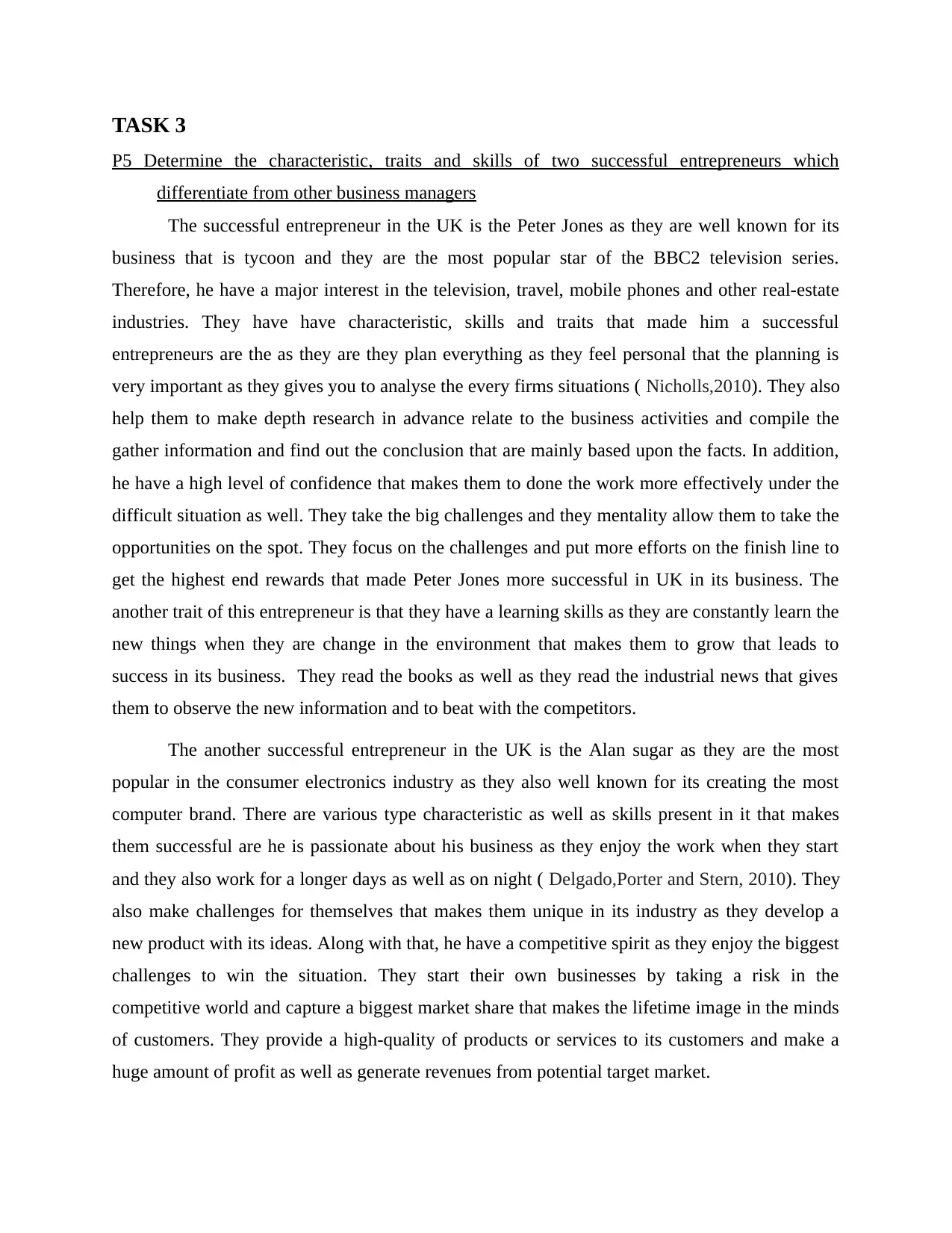
TASK 3
P5 Determine the characteristic, traits and skills of two successful entrepreneurs which
differentiate from other business managers
The successful entrepreneur in the UK is the Peter Jones as they are well known for its
business that is tycoon and they are the most popular star of the BBC2 television series.
Therefore, he have a major interest in the television, travel, mobile phones and other real-estate
industries. They have have characteristic, skills and traits that made him a successful
entrepreneurs are the as they are they plan everything as they feel personal that the planning is
very important as they gives you to analyse the every firms situations ( Nicholls,2010). They also
help them to make depth research in advance relate to the business activities and compile the
gather information and find out the conclusion that are mainly based upon the facts. In addition,
he have a high level of confidence that makes them to done the work more effectively under the
difficult situation as well. They take the big challenges and they mentality allow them to take the
opportunities on the spot. They focus on the challenges and put more efforts on the finish line to
get the highest end rewards that made Peter Jones more successful in UK in its business. The
another trait of this entrepreneur is that they have a learning skills as they are constantly learn the
new things when they are change in the environment that makes them to grow that leads to
success in its business. They read the books as well as they read the industrial news that gives
them to observe the new information and to beat with the competitors.
The another successful entrepreneur in the UK is the Alan sugar as they are the most
popular in the consumer electronics industry as they also well known for its creating the most
computer brand. There are various type characteristic as well as skills present in it that makes
them successful are he is passionate about his business as they enjoy the work when they start
and they also work for a longer days as well as on night ( Delgado,Porter and Stern, 2010). They
also make challenges for themselves that makes them unique in its industry as they develop a
new product with its ideas. Along with that, he have a competitive spirit as they enjoy the biggest
challenges to win the situation. They start their own businesses by taking a risk in the
competitive world and capture a biggest market share that makes the lifetime image in the minds
of customers. They provide a high-quality of products or services to its customers and make a
huge amount of profit as well as generate revenues from potential target market.
P5 Determine the characteristic, traits and skills of two successful entrepreneurs which
differentiate from other business managers
The successful entrepreneur in the UK is the Peter Jones as they are well known for its
business that is tycoon and they are the most popular star of the BBC2 television series.
Therefore, he have a major interest in the television, travel, mobile phones and other real-estate
industries. They have have characteristic, skills and traits that made him a successful
entrepreneurs are the as they are they plan everything as they feel personal that the planning is
very important as they gives you to analyse the every firms situations ( Nicholls,2010). They also
help them to make depth research in advance relate to the business activities and compile the
gather information and find out the conclusion that are mainly based upon the facts. In addition,
he have a high level of confidence that makes them to done the work more effectively under the
difficult situation as well. They take the big challenges and they mentality allow them to take the
opportunities on the spot. They focus on the challenges and put more efforts on the finish line to
get the highest end rewards that made Peter Jones more successful in UK in its business. The
another trait of this entrepreneur is that they have a learning skills as they are constantly learn the
new things when they are change in the environment that makes them to grow that leads to
success in its business. They read the books as well as they read the industrial news that gives
them to observe the new information and to beat with the competitors.
The another successful entrepreneur in the UK is the Alan sugar as they are the most
popular in the consumer electronics industry as they also well known for its creating the most
computer brand. There are various type characteristic as well as skills present in it that makes
them successful are he is passionate about his business as they enjoy the work when they start
and they also work for a longer days as well as on night ( Delgado,Porter and Stern, 2010). They
also make challenges for themselves that makes them unique in its industry as they develop a
new product with its ideas. Along with that, he have a competitive spirit as they enjoy the biggest
challenges to win the situation. They start their own businesses by taking a risk in the
competitive world and capture a biggest market share that makes the lifetime image in the minds
of customers. They provide a high-quality of products or services to its customers and make a
huge amount of profit as well as generate revenues from potential target market.
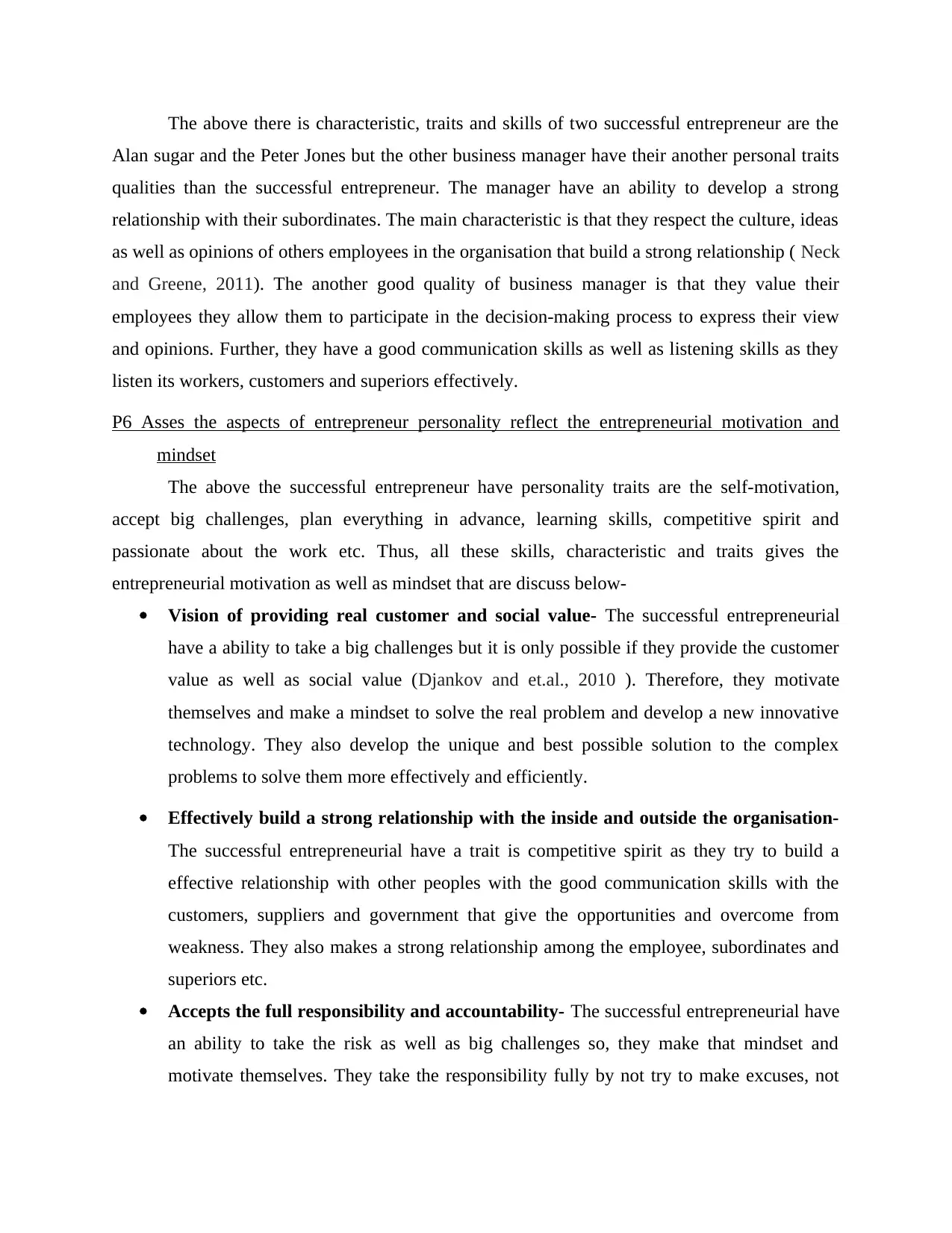
The above there is characteristic, traits and skills of two successful entrepreneur are the
Alan sugar and the Peter Jones but the other business manager have their another personal traits
qualities than the successful entrepreneur. The manager have an ability to develop a strong
relationship with their subordinates. The main characteristic is that they respect the culture, ideas
as well as opinions of others employees in the organisation that build a strong relationship ( Neck
and Greene, 2011). The another good quality of business manager is that they value their
employees they allow them to participate in the decision-making process to express their view
and opinions. Further, they have a good communication skills as well as listening skills as they
listen its workers, customers and superiors effectively.
P6 Asses the aspects of entrepreneur personality reflect the entrepreneurial motivation and
mindset
The above the successful entrepreneur have personality traits are the self-motivation,
accept big challenges, plan everything in advance, learning skills, competitive spirit and
passionate about the work etc. Thus, all these skills, characteristic and traits gives the
entrepreneurial motivation as well as mindset that are discuss below-
Vision of providing real customer and social value- The successful entrepreneurial
have a ability to take a big challenges but it is only possible if they provide the customer
value as well as social value (Djankov and et.al., 2010 ). Therefore, they motivate
themselves and make a mindset to solve the real problem and develop a new innovative
technology. They also develop the unique and best possible solution to the complex
problems to solve them more effectively and efficiently.
Effectively build a strong relationship with the inside and outside the organisation-
The successful entrepreneurial have a trait is competitive spirit as they try to build a
effective relationship with other peoples with the good communication skills with the
customers, suppliers and government that give the opportunities and overcome from
weakness. They also makes a strong relationship among the employee, subordinates and
superiors etc.
Accepts the full responsibility and accountability- The successful entrepreneurial have
an ability to take the risk as well as big challenges so, they make that mindset and
motivate themselves. They take the responsibility fully by not try to make excuses, not
Alan sugar and the Peter Jones but the other business manager have their another personal traits
qualities than the successful entrepreneur. The manager have an ability to develop a strong
relationship with their subordinates. The main characteristic is that they respect the culture, ideas
as well as opinions of others employees in the organisation that build a strong relationship ( Neck
and Greene, 2011). The another good quality of business manager is that they value their
employees they allow them to participate in the decision-making process to express their view
and opinions. Further, they have a good communication skills as well as listening skills as they
listen its workers, customers and superiors effectively.
P6 Asses the aspects of entrepreneur personality reflect the entrepreneurial motivation and
mindset
The above the successful entrepreneur have personality traits are the self-motivation,
accept big challenges, plan everything in advance, learning skills, competitive spirit and
passionate about the work etc. Thus, all these skills, characteristic and traits gives the
entrepreneurial motivation as well as mindset that are discuss below-
Vision of providing real customer and social value- The successful entrepreneurial
have a ability to take a big challenges but it is only possible if they provide the customer
value as well as social value (Djankov and et.al., 2010 ). Therefore, they motivate
themselves and make a mindset to solve the real problem and develop a new innovative
technology. They also develop the unique and best possible solution to the complex
problems to solve them more effectively and efficiently.
Effectively build a strong relationship with the inside and outside the organisation-
The successful entrepreneurial have a trait is competitive spirit as they try to build a
effective relationship with other peoples with the good communication skills with the
customers, suppliers and government that give the opportunities and overcome from
weakness. They also makes a strong relationship among the employee, subordinates and
superiors etc.
Accepts the full responsibility and accountability- The successful entrepreneurial have
an ability to take the risk as well as big challenges so, they make that mindset and
motivate themselves. They take the responsibility fully by not try to make excuses, not
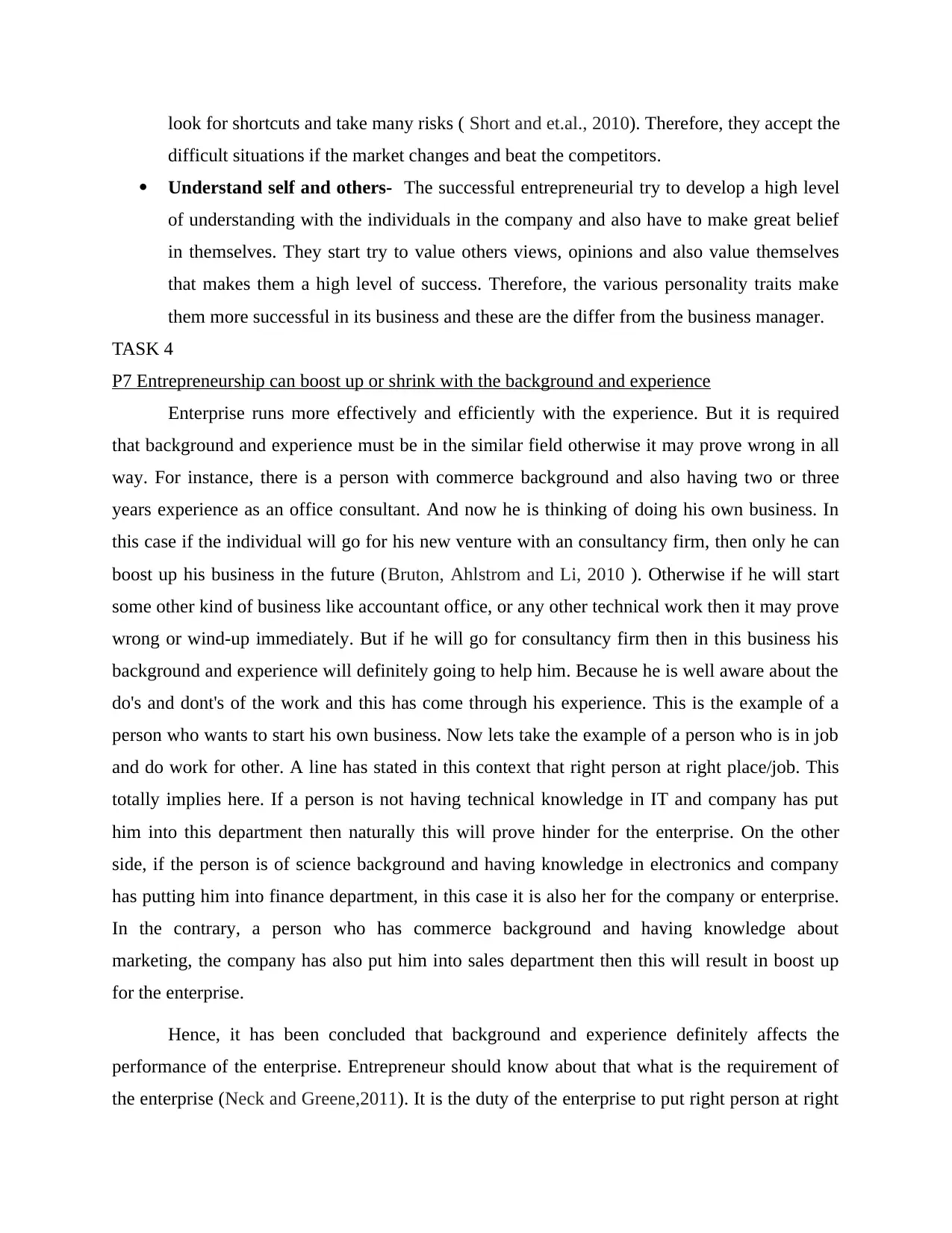
look for shortcuts and take many risks ( Short and et.al., 2010). Therefore, they accept the
difficult situations if the market changes and beat the competitors.
Understand self and others- The successful entrepreneurial try to develop a high level
of understanding with the individuals in the company and also have to make great belief
in themselves. They start try to value others views, opinions and also value themselves
that makes them a high level of success. Therefore, the various personality traits make
them more successful in its business and these are the differ from the business manager.
TASK 4
P7 Entrepreneurship can boost up or shrink with the background and experience
Enterprise runs more effectively and efficiently with the experience. But it is required
that background and experience must be in the similar field otherwise it may prove wrong in all
way. For instance, there is a person with commerce background and also having two or three
years experience as an office consultant. And now he is thinking of doing his own business. In
this case if the individual will go for his new venture with an consultancy firm, then only he can
boost up his business in the future (Bruton, Ahlstrom and Li, 2010 ). Otherwise if he will start
some other kind of business like accountant office, or any other technical work then it may prove
wrong or wind-up immediately. But if he will go for consultancy firm then in this business his
background and experience will definitely going to help him. Because he is well aware about the
do's and dont's of the work and this has come through his experience. This is the example of a
person who wants to start his own business. Now lets take the example of a person who is in job
and do work for other. A line has stated in this context that right person at right place/job. This
totally implies here. If a person is not having technical knowledge in IT and company has put
him into this department then naturally this will prove hinder for the enterprise. On the other
side, if the person is of science background and having knowledge in electronics and company
has putting him into finance department, in this case it is also her for the company or enterprise.
In the contrary, a person who has commerce background and having knowledge about
marketing, the company has also put him into sales department then this will result in boost up
for the enterprise.
Hence, it has been concluded that background and experience definitely affects the
performance of the enterprise. Entrepreneur should know about that what is the requirement of
the enterprise (Neck and Greene,2011). It is the duty of the enterprise to put right person at right
difficult situations if the market changes and beat the competitors.
Understand self and others- The successful entrepreneurial try to develop a high level
of understanding with the individuals in the company and also have to make great belief
in themselves. They start try to value others views, opinions and also value themselves
that makes them a high level of success. Therefore, the various personality traits make
them more successful in its business and these are the differ from the business manager.
TASK 4
P7 Entrepreneurship can boost up or shrink with the background and experience
Enterprise runs more effectively and efficiently with the experience. But it is required
that background and experience must be in the similar field otherwise it may prove wrong in all
way. For instance, there is a person with commerce background and also having two or three
years experience as an office consultant. And now he is thinking of doing his own business. In
this case if the individual will go for his new venture with an consultancy firm, then only he can
boost up his business in the future (Bruton, Ahlstrom and Li, 2010 ). Otherwise if he will start
some other kind of business like accountant office, or any other technical work then it may prove
wrong or wind-up immediately. But if he will go for consultancy firm then in this business his
background and experience will definitely going to help him. Because he is well aware about the
do's and dont's of the work and this has come through his experience. This is the example of a
person who wants to start his own business. Now lets take the example of a person who is in job
and do work for other. A line has stated in this context that right person at right place/job. This
totally implies here. If a person is not having technical knowledge in IT and company has put
him into this department then naturally this will prove hinder for the enterprise. On the other
side, if the person is of science background and having knowledge in electronics and company
has putting him into finance department, in this case it is also her for the company or enterprise.
In the contrary, a person who has commerce background and having knowledge about
marketing, the company has also put him into sales department then this will result in boost up
for the enterprise.
Hence, it has been concluded that background and experience definitely affects the
performance of the enterprise. Entrepreneur should know about that what is the requirement of
the enterprise (Neck and Greene,2011). It is the duty of the enterprise to put right person at right
Secure Best Marks with AI Grader
Need help grading? Try our AI Grader for instant feedback on your assignments.
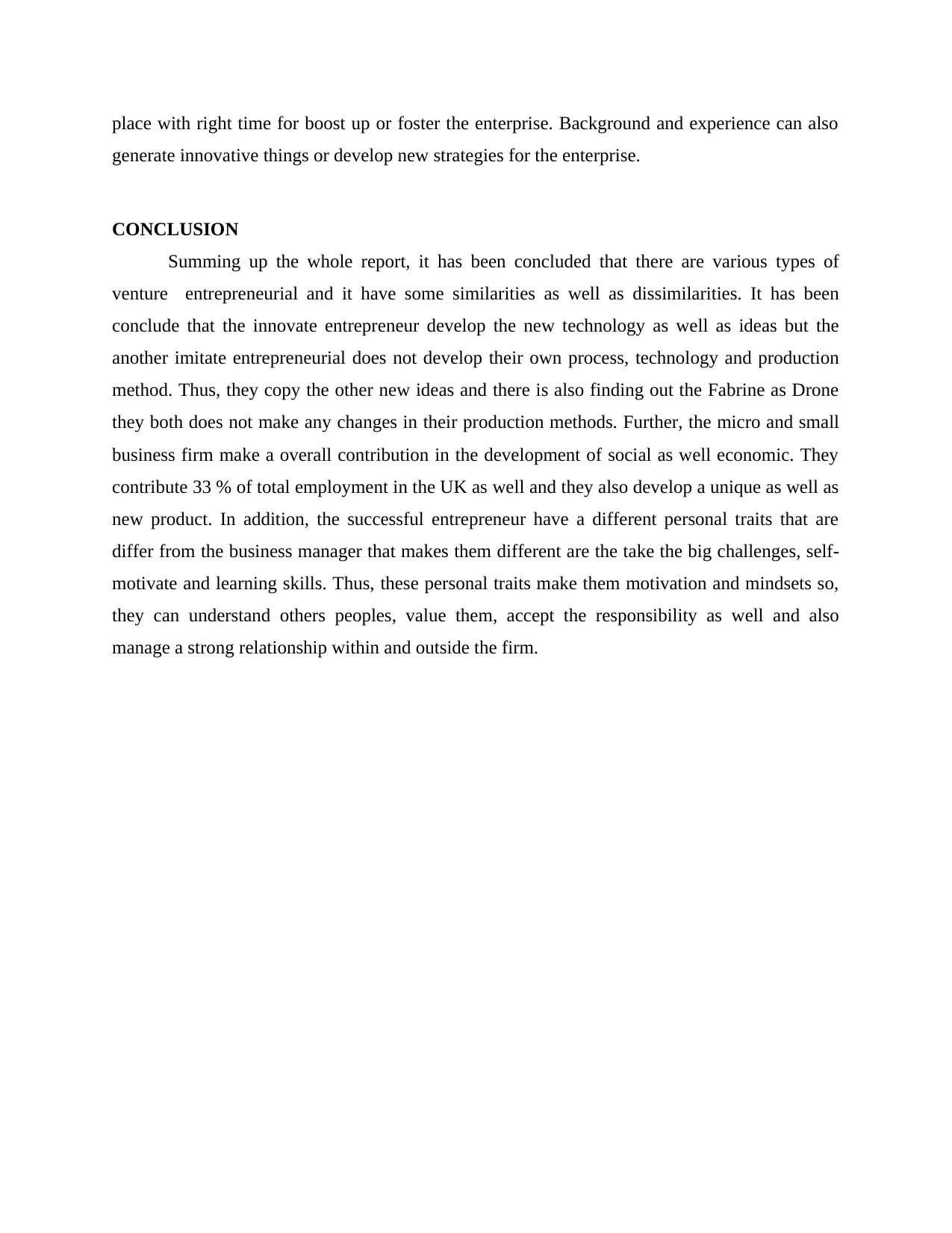
place with right time for boost up or foster the enterprise. Background and experience can also
generate innovative things or develop new strategies for the enterprise.
CONCLUSION
Summing up the whole report, it has been concluded that there are various types of
venture entrepreneurial and it have some similarities as well as dissimilarities. It has been
conclude that the innovate entrepreneur develop the new technology as well as ideas but the
another imitate entrepreneurial does not develop their own process, technology and production
method. Thus, they copy the other new ideas and there is also finding out the Fabrine as Drone
they both does not make any changes in their production methods. Further, the micro and small
business firm make a overall contribution in the development of social as well economic. They
contribute 33 % of total employment in the UK as well and they also develop a unique as well as
new product. In addition, the successful entrepreneur have a different personal traits that are
differ from the business manager that makes them different are the take the big challenges, self-
motivate and learning skills. Thus, these personal traits make them motivation and mindsets so,
they can understand others peoples, value them, accept the responsibility as well and also
manage a strong relationship within and outside the firm.
generate innovative things or develop new strategies for the enterprise.
CONCLUSION
Summing up the whole report, it has been concluded that there are various types of
venture entrepreneurial and it have some similarities as well as dissimilarities. It has been
conclude that the innovate entrepreneur develop the new technology as well as ideas but the
another imitate entrepreneurial does not develop their own process, technology and production
method. Thus, they copy the other new ideas and there is also finding out the Fabrine as Drone
they both does not make any changes in their production methods. Further, the micro and small
business firm make a overall contribution in the development of social as well economic. They
contribute 33 % of total employment in the UK as well and they also develop a unique as well as
new product. In addition, the successful entrepreneur have a different personal traits that are
differ from the business manager that makes them different are the take the big challenges, self-
motivate and learning skills. Thus, these personal traits make them motivation and mindsets so,
they can understand others peoples, value them, accept the responsibility as well and also
manage a strong relationship within and outside the firm.

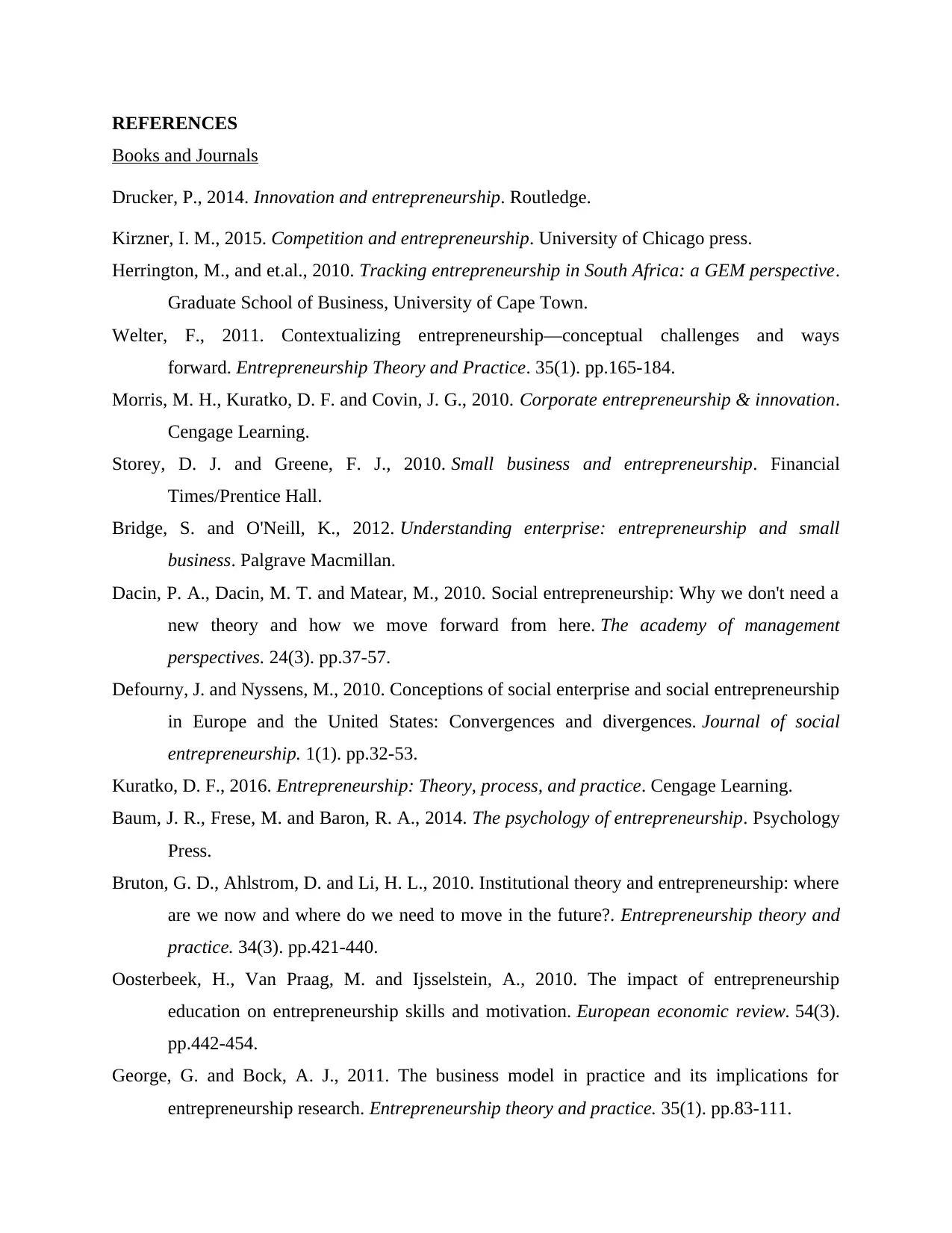
REFERENCES
Books and Journals
Drucker, P., 2014. Innovation and entrepreneurship. Routledge.
Kirzner, I. M., 2015. Competition and entrepreneurship. University of Chicago press.
Herrington, M., and et.al., 2010. Tracking entrepreneurship in South Africa: a GEM perspective.
Graduate School of Business, University of Cape Town.
Welter, F., 2011. Contextualizing entrepreneurship—conceptual challenges and ways
forward. Entrepreneurship Theory and Practice. 35(1). pp.165-184.
Morris, M. H., Kuratko, D. F. and Covin, J. G., 2010. Corporate entrepreneurship & innovation.
Cengage Learning.
Storey, D. J. and Greene, F. J., 2010. Small business and entrepreneurship. Financial
Times/Prentice Hall.
Bridge, S. and O'Neill, K., 2012. Understanding enterprise: entrepreneurship and small
business. Palgrave Macmillan.
Dacin, P. A., Dacin, M. T. and Matear, M., 2010. Social entrepreneurship: Why we don't need a
new theory and how we move forward from here. The academy of management
perspectives. 24(3). pp.37-57.
Defourny, J. and Nyssens, M., 2010. Conceptions of social enterprise and social entrepreneurship
in Europe and the United States: Convergences and divergences. Journal of social
entrepreneurship. 1(1). pp.32-53.
Kuratko, D. F., 2016. Entrepreneurship: Theory, process, and practice. Cengage Learning.
Baum, J. R., Frese, M. and Baron, R. A., 2014. The psychology of entrepreneurship. Psychology
Press.
Bruton, G. D., Ahlstrom, D. and Li, H. L., 2010. Institutional theory and entrepreneurship: where
are we now and where do we need to move in the future?. Entrepreneurship theory and
practice. 34(3). pp.421-440.
Oosterbeek, H., Van Praag, M. and Ijsselstein, A., 2010. The impact of entrepreneurship
education on entrepreneurship skills and motivation. European economic review. 54(3).
pp.442-454.
George, G. and Bock, A. J., 2011. The business model in practice and its implications for
entrepreneurship research. Entrepreneurship theory and practice. 35(1). pp.83-111.
Books and Journals
Drucker, P., 2014. Innovation and entrepreneurship. Routledge.
Kirzner, I. M., 2015. Competition and entrepreneurship. University of Chicago press.
Herrington, M., and et.al., 2010. Tracking entrepreneurship in South Africa: a GEM perspective.
Graduate School of Business, University of Cape Town.
Welter, F., 2011. Contextualizing entrepreneurship—conceptual challenges and ways
forward. Entrepreneurship Theory and Practice. 35(1). pp.165-184.
Morris, M. H., Kuratko, D. F. and Covin, J. G., 2010. Corporate entrepreneurship & innovation.
Cengage Learning.
Storey, D. J. and Greene, F. J., 2010. Small business and entrepreneurship. Financial
Times/Prentice Hall.
Bridge, S. and O'Neill, K., 2012. Understanding enterprise: entrepreneurship and small
business. Palgrave Macmillan.
Dacin, P. A., Dacin, M. T. and Matear, M., 2010. Social entrepreneurship: Why we don't need a
new theory and how we move forward from here. The academy of management
perspectives. 24(3). pp.37-57.
Defourny, J. and Nyssens, M., 2010. Conceptions of social enterprise and social entrepreneurship
in Europe and the United States: Convergences and divergences. Journal of social
entrepreneurship. 1(1). pp.32-53.
Kuratko, D. F., 2016. Entrepreneurship: Theory, process, and practice. Cengage Learning.
Baum, J. R., Frese, M. and Baron, R. A., 2014. The psychology of entrepreneurship. Psychology
Press.
Bruton, G. D., Ahlstrom, D. and Li, H. L., 2010. Institutional theory and entrepreneurship: where
are we now and where do we need to move in the future?. Entrepreneurship theory and
practice. 34(3). pp.421-440.
Oosterbeek, H., Van Praag, M. and Ijsselstein, A., 2010. The impact of entrepreneurship
education on entrepreneurship skills and motivation. European economic review. 54(3).
pp.442-454.
George, G. and Bock, A. J., 2011. The business model in practice and its implications for
entrepreneurship research. Entrepreneurship theory and practice. 35(1). pp.83-111.
Paraphrase This Document
Need a fresh take? Get an instant paraphrase of this document with our AI Paraphraser
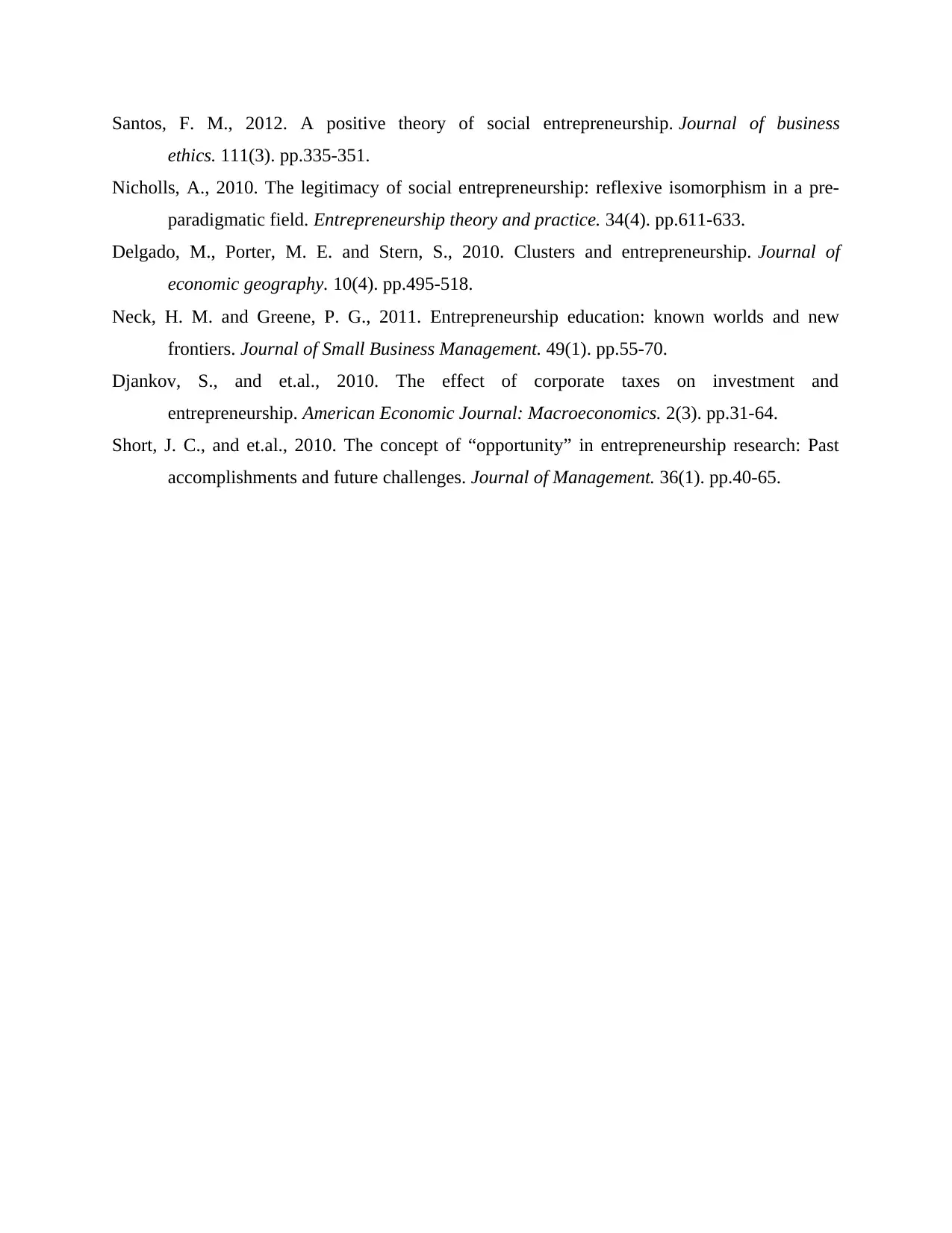
Santos, F. M., 2012. A positive theory of social entrepreneurship. Journal of business
ethics. 111(3). pp.335-351.
Nicholls, A., 2010. The legitimacy of social entrepreneurship: reflexive isomorphism in a pre‐
paradigmatic field. Entrepreneurship theory and practice. 34(4). pp.611-633.
Delgado, M., Porter, M. E. and Stern, S., 2010. Clusters and entrepreneurship. Journal of
economic geography. 10(4). pp.495-518.
Neck, H. M. and Greene, P. G., 2011. Entrepreneurship education: known worlds and new
frontiers. Journal of Small Business Management. 49(1). pp.55-70.
Djankov, S., and et.al., 2010. The effect of corporate taxes on investment and
entrepreneurship. American Economic Journal: Macroeconomics. 2(3). pp.31-64.
Short, J. C., and et.al., 2010. The concept of “opportunity” in entrepreneurship research: Past
accomplishments and future challenges. Journal of Management. 36(1). pp.40-65.
ethics. 111(3). pp.335-351.
Nicholls, A., 2010. The legitimacy of social entrepreneurship: reflexive isomorphism in a pre‐
paradigmatic field. Entrepreneurship theory and practice. 34(4). pp.611-633.
Delgado, M., Porter, M. E. and Stern, S., 2010. Clusters and entrepreneurship. Journal of
economic geography. 10(4). pp.495-518.
Neck, H. M. and Greene, P. G., 2011. Entrepreneurship education: known worlds and new
frontiers. Journal of Small Business Management. 49(1). pp.55-70.
Djankov, S., and et.al., 2010. The effect of corporate taxes on investment and
entrepreneurship. American Economic Journal: Macroeconomics. 2(3). pp.31-64.
Short, J. C., and et.al., 2010. The concept of “opportunity” in entrepreneurship research: Past
accomplishments and future challenges. Journal of Management. 36(1). pp.40-65.
1 out of 14
Related Documents
Your All-in-One AI-Powered Toolkit for Academic Success.
+13062052269
info@desklib.com
Available 24*7 on WhatsApp / Email
![[object Object]](/_next/static/media/star-bottom.7253800d.svg)
Unlock your academic potential
© 2024 | Zucol Services PVT LTD | All rights reserved.





